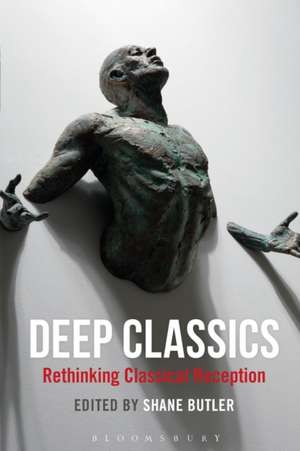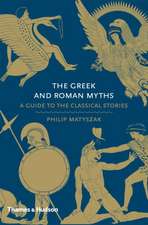Deep Classics: Rethinking Classical Reception
Editat de Professor Shane Butleren Limba Engleză Paperback – 4 mai 2016
| Toate formatele și edițiile | Preț | Express |
|---|---|---|
| Paperback (1) | 181.84 lei 3-5 săpt. | |
| Bloomsbury Publishing – 4 mai 2016 | 181.84 lei 3-5 săpt. | |
| Hardback (1) | 572.06 lei 6-8 săpt. | |
| Bloomsbury Publishing – 4 mai 2016 | 572.06 lei 6-8 săpt. |
Preț: 181.84 lei
Preț vechi: 209.49 lei
-13% Nou
Puncte Express: 273
Preț estimativ în valută:
34.81€ • 37.82$ • 29.26£
34.81€ • 37.82$ • 29.26£
Carte disponibilă
Livrare economică 31 martie-14 aprilie
Preluare comenzi: 021 569.72.76
Specificații
ISBN-13: 9781474260510
ISBN-10: 1474260519
Pagini: 360
Ilustrații: 30 bw illus
Dimensiuni: 156 x 234 x 19 mm
Greutate: 0.5 kg
Editura: Bloomsbury Publishing
Colecția Bloomsbury Academic
Locul publicării:London, United Kingdom
ISBN-10: 1474260519
Pagini: 360
Ilustrații: 30 bw illus
Dimensiuni: 156 x 234 x 19 mm
Greutate: 0.5 kg
Editura: Bloomsbury Publishing
Colecția Bloomsbury Academic
Locul publicării:London, United Kingdom
Caracteristici
Seminal article by the editor Shane Butler, which will be required reading for all academics in this field and make this a necessary library purchase
Notă biografică
Shane Butler is Professor of Classics at Johns Hopkins University, USA. He is author of The Ancient Phonograph (2015) and co-editor of Synaesthesia and the Ancient Senses (2013).
Cuprins
Acknowledgments Notes on the Contributors Introduction. On the Origin of "Deep Classics", Shane Butler 1. Homer's Deep, Shane Butler 2. The Sigh of Philhellenism, Joshua Billings 3. Feeling on the Surface: Touch and Emotion in Fuseli and Homer, Alex Purves 4. Perceiving (in) Depth: Landscape, Sculpture, Ruin, Helen Slaney 5. Etymological 'Alterity': Depths and Heights, Joshua Katz 6. Shut Your Eyes and See, Adam Lecznar 7. The loss of telos: Pasolini, Fugard, and the Oresteia, Sarah Nooter 8. Kings of the Stone Age, or How to Read an Ancient Inscription, Stephanie Ann Frampton 9. Queer Unhistoricism: Scholars, Metalepsis, and Interventions of the Unruly Past, Sebastian Matzner 10. Affects and contexts. A deep history of erotic anger, Giulia Sissa 11. Ghostwritten Classics, Edmund Richardson 12. Relic | channel | ghost: Centaurs in Algernon Blackwood's The Centaur, Mark Payne 13. Circulation of Spectres: Ghosts and Spells, Davide Susanetti 14. Cosmopoiesis in the Field of the Classical, Brooke Holmes 15. Borges and the Disclosure of Antiquity, Laura Jansen Bibliography Index
Recenzii
The fruits of this volume are various. As a whole, it provides a welcome recharging of an intermittent conversation about how we conceive of, relate to and study the ancient world.
As a breeding ground of Ph.D. theses, this is wonderfully fertile soil ... [The book] opens areas where we may not have looked before.
If one reads the collection sequentially ... What follows is a series of diverse and absorbing chapters ranging in form from narrow(er)-focus case studies (e.g. M. Payne, S. Nooter) to wide-focus meditations on the state of the field. The pieces are thoughtful, often provocative, always thoughtprovoking.
If you want the deepest thoughts of the cleverest classicists alive today, read this volume. These essays bore into our relationship with the past, exposing and exploiting the sublime, geological metaphors of profundity and collapse that structure our relationship with distant antiquity. Yet for all that they bore, they never bore: these are thrilling soundings, which will captivate anyone interested in (re)thinking 'deep' antiquity.
The subtitle of this important book calls on us to rethink classical reception, currently the fastest growing area of the subject but one badly in need of a fresh injection of intellectual energy. This Shane Butler, with his powerful idea of 'Deep Classics', and his team of talented contributors provide in spades. Anyone interested in how classical reception studies are best pursued will benefit from reading it.
Every page brings new, discrete pleasures. These essays dazzle in their inventiveness and vitality. This collection is powerful reminder about why the study of classical antiquity and its legacy matters.
In its capacity for provocation as much as theoretical self-awareness, the present volume is a major intervention in classical reception studies. It provides an excellent core sample of the state of the art with the confident hallmarks of a sub-discipline that is no longer required to make the case for its existence, or perhaps worse, domesticated as "a detachable postscript" . Deep Classics: Rethinking Classical Reception is essential and stimulating reading for those both in the field of classical reception studies and beyond: it certainly deserves a wide audience.
As a breeding ground of Ph.D. theses, this is wonderfully fertile soil ... [The book] opens areas where we may not have looked before.
If one reads the collection sequentially ... What follows is a series of diverse and absorbing chapters ranging in form from narrow(er)-focus case studies (e.g. M. Payne, S. Nooter) to wide-focus meditations on the state of the field. The pieces are thoughtful, often provocative, always thoughtprovoking.
If you want the deepest thoughts of the cleverest classicists alive today, read this volume. These essays bore into our relationship with the past, exposing and exploiting the sublime, geological metaphors of profundity and collapse that structure our relationship with distant antiquity. Yet for all that they bore, they never bore: these are thrilling soundings, which will captivate anyone interested in (re)thinking 'deep' antiquity.
The subtitle of this important book calls on us to rethink classical reception, currently the fastest growing area of the subject but one badly in need of a fresh injection of intellectual energy. This Shane Butler, with his powerful idea of 'Deep Classics', and his team of talented contributors provide in spades. Anyone interested in how classical reception studies are best pursued will benefit from reading it.
Every page brings new, discrete pleasures. These essays dazzle in their inventiveness and vitality. This collection is powerful reminder about why the study of classical antiquity and its legacy matters.
In its capacity for provocation as much as theoretical self-awareness, the present volume is a major intervention in classical reception studies. It provides an excellent core sample of the state of the art with the confident hallmarks of a sub-discipline that is no longer required to make the case for its existence, or perhaps worse, domesticated as "a detachable postscript" . Deep Classics: Rethinking Classical Reception is essential and stimulating reading for those both in the field of classical reception studies and beyond: it certainly deserves a wide audience.














